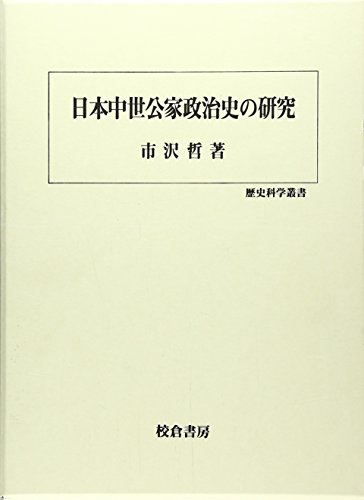28 0 0 0 日本中世公家政治史の研究
25 0 0 0 IR 映画『もののけ姫』分析--歴史ファンタジーに歴史学はどう関わるか (特集 歴史と文学)
- 著者
- 市沢 哲
- 出版者
- 神戸大学文学部国語国文学会
- 雑誌
- 国文論叢 (ISSN:02866412)
- 巻号頁・発行日
- no.34, pp.94-109, 2004-03
11 0 0 0 OA 大規模自然災害時の史料保全論を基礎とした地域歴史資料学の構築
- 著者
- 奥村 弘 市沢 哲 坂江 渉 佐々木 和子 平川 新 矢田 俊文 今津 勝紀 小林 准士 寺内 浩 足立 裕司 内田 俊秀 久留島 浩 伊藤 明弘 松下 正和 添田 仁 三村 昌司 多仁 照廣
- 出版者
- 神戸大学
- 雑誌
- 基盤研究(S)
- 巻号頁・発行日
- 2009-05-11
大規模自然災害と地域社会の急激な構造転換の中で、歴史資料は滅失の危機にある。その保存活用を研究する新たな学として地域歴史資料学の構築をめざした。その成果は、第1に、地域住民もまた保存活用の主体と考え地域歴史資料を次世代につなぐ体系的な研究手法を構築しえたことにある。第2は、それを可能とする具体的な地域歴史資料の保存と修復の方法を組み込んだことである。第3は、科研の中間で起こった東日本大震災での地域歴史資料保存について理念と具体的な方法を提示するとともに、全国的な研究者ネットワークによる支援体制を構築したことである。第4は、地域歴史資料学をグローバルイシューとして国際的に発信したことである。
- 著者
- 市沢 哲
- 出版者
- 物語研究会
- 雑誌
- 物語研究 (ISSN:13481622)
- 巻号頁・発行日
- vol.10, pp.84-95, 2010-03-31 (Released:2018-03-27)
Emperor Hanazono was a retired emperor at the margins. As such, he used scholarship as a tool to counter the courtiers who frequently employed the Daikakuji line and the continuation of the family for their own interests, and to justify his own position. Consequently, such scholarship was not intended to redesign the scheme that stressed the lord-vassal relationship as based on propriety (rei) and the concept of the transfer of heaven's mandate (ekisei kakumei), but it resembled "the king and the subject" (taigi meibun) concept. Moreover, Hanazono's praising of the scholarship surrounding Emperor Go-Daigo was a way for him to underscore his own superiority. Needless to say, Hanazono's learning did not exist as an independent entity but contained important political and historical aspects. The issue of fourteenth-century scholarship, especially Neo-Confucianism, has come to be viewed as a reception of Emperor Go-Daigo's political scheme and the concept of the transfer of heaven's mandate. Within this context, The Diary of Emperor Hanazono has often acted as a source for frequent reference. Previous studies have tended to de-contextualize the individual descriptions of the events and Hanazono's views on scholarship as recorded in The Diary. Finding this problematic as an approach, I argue for the importance of contextualizing these descriptions within the frame of The Diary, and propose a new reading.
- 著者
- 市沢 哲
- 出版者
- 神戸大学大学院人文学研究科地域連携センター
- 雑誌
- Link : 地域・大学・文化 (ISSN:21856265)
- 巻号頁・発行日
- vol.7, pp.14-17, 2015-12
- 著者
- 市沢 哲
- 出版者
- 物語研究会
- 雑誌
- 物語研究 (ISSN:13481622)
- 巻号頁・発行日
- vol.10, pp.84-95, 2010
Emperor Hanazono was a retired emperor at the margins. As such, he used scholarship as a tool to counter the courtiers who frequently employed the Daikakuji line and the continuation of the family for their own interests, and to justify his own position. Consequently, such scholarship was not intended to redesign the scheme that stressed the lord-vassal relationship as based on propriety (rei) and the concept of the transfer of heaven's mandate (ekisei kakumei), but it resembled "the king and the subject" (taigi meibun) concept. Moreover, Hanazono's praising of the scholarship surrounding Emperor Go-Daigo was a way for him to underscore his own superiority. Needless to say, Hanazono's learning did not exist as an independent entity but contained important political and historical aspects. The issue of fourteenth-century scholarship, especially Neo-Confucianism, has come to be viewed as a reception of Emperor Go-Daigo's political scheme and the concept of the transfer of heaven's mandate. Within this context, The Diary of Emperor Hanazono has often acted as a source for frequent reference. Previous studies have tended to de-contextualize the individual descriptions of the events and Hanazono's views on scholarship as recorded in The Diary. Finding this problematic as an approach, I argue for the importance of contextualizing these descriptions within the frame of The Diary, and propose a new reading.
- 著者
- 屋宜 明彦 市沢 哲(司会) 井上 舞 木村 修二 古市 晃
- 出版者
- 神戸大学大学院人文学研究科地域連携センター
- 雑誌
- Link : 地域・大学・文化 : 神戸大学大学院人文学研究科地域連携センター年報 (ISSN:21856265)
- 巻号頁・発行日
- no.11, pp.63-88, 2019-12
1 0 0 0 建武・暦応の西摂津・北摂津合戦
- 著者
- 市沢 哲
- 出版者
- 兵庫県
- 雑誌
- 新兵庫県の歴史 (ISSN:18834523)
- 巻号頁・発行日
- no.3, pp.13-28, 2011-03
1 0 0 0 雑掌・悪党・両使 : 摂津国長洲荘の場合
- 著者
- 市沢 哲
- 出版者
- 日本史研究会
- 雑誌
- 日本史研究 = Journal of Japanese history (ISSN:03868850)
- 巻号頁・発行日
- no.650, pp.1-23, 2016-10
- 著者
- 市沢 哲
- 出版者
- 神戸大学
- 雑誌
- Link : 地域・大学・文化 : 神戸大学大学院人文学研究科地域連携センター年報
- 巻号頁・発行日
- vol.5, 2013-11-30
- 著者
- 市沢 哲
- 出版者
- 神戸大学文学部国語国文学会
- 雑誌
- 国文論叢 (ISSN:02866412)
- 巻号頁・発行日
- no.34, pp.94-109, 2004-03
